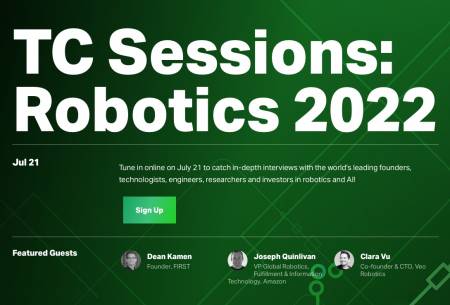Five Traps for Robots in Human Environments….And How to Avoid Them
Abstract: Robotics today is moving beyond fixed environments and into human spaces like homes, restaurants, and hospitals. In these new spaces, robots will necessarily have to interact with people. In some sense, every recent robotics problem is partly a human-robot interaction problem. Thus, the field of HRI can offer insights to the broader robotics community [...]
MSR Thesis Talk: Ingrid Navarro Anaya
Title: Socially-Aware Trajectory Prediction Guided by Motion Patterns Abstract: As intelligent robots across domains start collaborating with humans in shared environments, e.g., urban settings and terminal airspace, algorithms that enable them to reason over human motion and intent are important to enable seamless and safe interplay. In our work, we study human intent by focusing on the [...]
Carnegie Mellon University
MSR Thesis Talk: Qichen Fu
Date: Tuesday, July 19, 2022 Time: 9:00 AM - 10:00 AM ET Location: Newell-Simon Hall (NSH) 3305 Title: Detect Active Object in a Sequential Voting Process Abstract: A key component of understanding hand-object interactions is the ability to identify the active object -- the object that is being manipulated by the human hand. In order to accurately localize the [...]
Carnegie Mellon University
MSR Thesis Talk: Ruohai Ge
Title: Real-Time Visual Localization System in Changing and Challenging Environments via Visual Place Recognition Abstract: Localization is one of the fundamental capabilities to guarantee reliable robot autonomy. Many excellent Visual-Inertial and LiDAR-based algorithms have been developed to solve the localization problem. However, deploying these methods on a real-time portable device is challenging due to high [...]
TechCrunch Sessions: Robotics 2022
Matt Johnson-Roberson will be one of the featured speakers in TC Sessions: Robotics 2022 on Thursday, July 21. You can register and stream for free! From the TechCrunch event site: Where Minds Meet Machines: The Future of Robotics Rapid advances in robotics technology continue to change the way businesses compete — and how people work [...]
Carnegie Mellon University
MSR Thesis Talk – Zixuan Huang
Title: Seeing the Unseen: Closed-loop Occlusion Reasoning for Cloth Manipulation Robotic manipulation of cloth remains challenging due to the complex dynamics of cloth, lack of a low-dimensional state representation, and self-occlusions. Particularly, self-occlusion makes it difficult to estimate the full state of the cloth, which poses significant challenges to policy learning and dynamics modeling. Ideally, [...]
Carnegie Mellon University
MSR Thesis Talk – Zhaoyuan Fang
Title: Features in Extra Dimensions: Spatial and Temporal Scene Representations Abstract: Computer vision models have made great progress in featurizing pixels of images. However, an image is only a projection of the actual 3D scene: occlusions and perspective distortions exist. To arrive at a better representation of the scene itself, extra dimensions are needed to [...]
Carnegie Mellon University
MSR Thesis Talk – Yunchu Zhang
Title: Library of behaviors and tools for robot manipulation Abstract: Learned policies often fail to generalize across environment variations, such as, different objects, object arrangements, or camera viewpoints. Moreover, most policies are trained and tested in simulation environments, and the sim2real gap remains large under weak visual representations that do not disentangle the scene from [...]
Carnegie Mellon University
Learning Structured World Model for Deformable Object Manipulation
Abstract: Manipulation of deformable objects challenges common assumptions in robotic manipulation, such as low-dimension state representation, known dynamics, and minimal occlusion. Deformable objects have high intrinsic state representation, complex dynamics with high degrees of freedom, and severe self-occlusion. These properties make them difficult for state estimation and planning. In this thesis, we introduce benchmarks and [...]
Safe control under input limits with neural CBF
Abstract: In theory, control barrier functions (CBFs) provide a convenient means to construct provably safe controllers. However, a typical problem is that the constructed controller will exceed input limits, and merely clipping the inputs will break all safety guarantees. To address this practical flaw, we consider synthesizing a CBF that will respect input limits. We [...]



